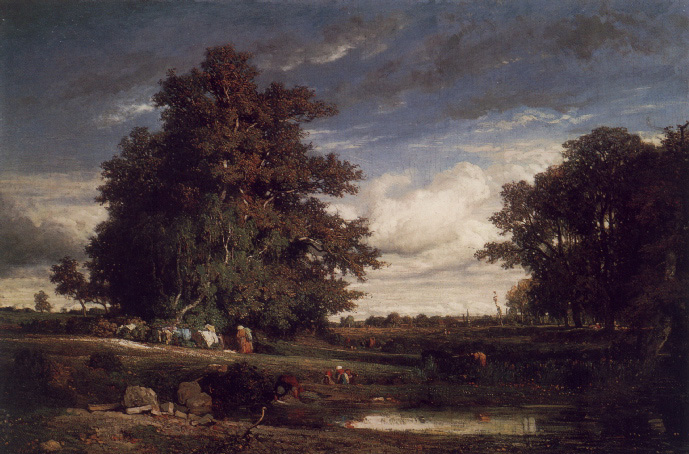
The value of any marsh is beyond a mere patch of real estate. As a repository of biological wealth the restoration of marshes represents geographical regeneration.
Troyon, The Marsh, 1840.
"Where we come from in America no longer signifies. It's where we go, and what we do when we get there, that tells us who we are."
Joyce Carol Oates,1938-now. (attributed)
Ecological value | Steps to understanding | Aldo Leopold's stories | Energy in redefining ecology | productivity of estuaries | Trophic ecology defined
Ecologically marshes, especially estuaries were shown to be among the most productive biological communities such as coral reefs and tropical rain forests.
| Plant communities as a percent of the Earth | Net Primary Productivity of plant associations | |
|---|---|---|
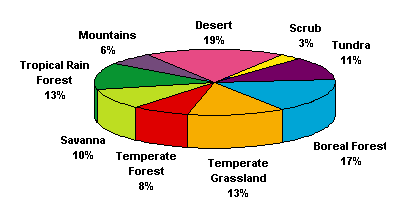 |
||
Barely visible as a significant slice of the world's vegetative areas. |
Yet, swamps, marsh, and estuaries are quite |
|

|
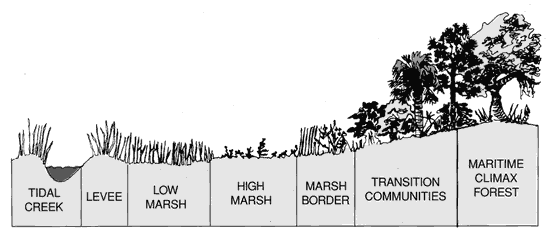 |
|
| First step: energetics | food webs | ecosystem logical dynamics | lakes as microcosms | land organism | cycles | integrity | coevolving | land paradox | ||
Steps in understanding this redefinition were ecology and the development of ecological ideas.
Three stories or fables, by Aldo Leopold were meant to convey the lessons of ecology to a wider public:
Delta Colorado 1922, Round River and Marshland Elegy
First step: energetics | food webs | ecosystem logical dynamics | lakes as microcosms | land organism | cycles | integrity | land paradox
Energetics or the study of energy in living systems is the initial step to understand these stories.
1. energy transfer and waste recycling of the New Ecology replaced older succession model
1.1: A. G. Tansley's ecosystem model, 1930s.
Trophic levels describe feeding levels in an ecological system
all ecologically coherent (predator and prey, habitation, reproduction, or range) associations can be understood inherently as a transference of energy, measured in calories, from one organism to another, over time.
Marshes of the Ocean Shore, page, 117.
1.2: Ecology, diversity and food web are all defined
without sufficient food, or surplus energy, predators and their parasites cannot survive over time to endure, climatic changes, fires, floods, droughts, or other disturbances that can undermine the vegetation and bacteria of certain biotic communities --the biocoenose is vulnerable to abrupt changes, unless there is sufficient production from vegetational complexes of plants, bacteria, and fungi.
First step: energetics | food webs | ecosystem logical dynamics | lakes as microcosms | land organism | cycles | integrity | land paradox
2. Ecosystem logic and solar energy transformation into biomass
2.1 Laws of Thermodynamics
Three fold shift in emphasis:
2.2, enlarged the concept of "the biological community" to understand how matter is created by bacteria and plants through sunlight, water and nutrients, to form biologically rich areas of life called biotic communities.
First step: energetics | food webs | ecosystem logical dynamics | lakes as microcosms | land organism | cycles | integrity | land paradox
Ecological revolt and the steps that led to an idea of places as small slices of the planet -- slices or pieces small enough to understand on a limited scale. That is a scale understandable enough to see the pieces and apply those to the larger ecosystems of the earth.
Step One: Lake as Microcosm, Forbes
Forbes worked for the Illinois State Natural History Survey
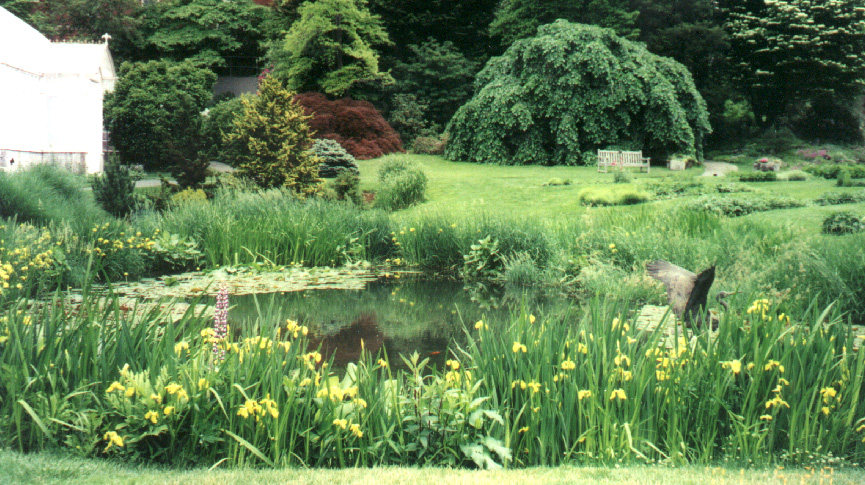 Step Two: Energy is transformed and transferred -- Lindeman's cedar bog lake study of energetics
Step Two: Energy is transformed and transferred -- Lindeman's cedar bog lake study of energetics
Decomposition was a key retriever of material or biomass made by nature
Step Three: Ecological functions are an indicator of sanitary, and functionally healthy conditions for predators and prey.
Energy dissipation and its challenge to ecology to overcome eventual decay and loss.
First step: energetics | food webs | ecosystem logical dynamics | lakes as microcosms | land organism | cycles | integrity | land paradox
The oceans are still not well understood, but their role in the energy distribution, rainfall and temperature on the earth is of the utmost importance to understanding ecology.
Sverdrup's story of the oceans as retrievers of heat and regulators of climate.
Gulf Coast plankton fishery studies revealed the role of phytoplankton, zooplankton, and benthic communities in sustaining important sport and commercial fisheries.
Step Four: Critique of one dimensional planning based on linear thinking as opposed to models of cybernetic feedback, and ecological accounting.
First step: energetics | food webs | ecosystem logical dynamics | lakes as microcosms | land organism | cycles | integrity | land paradox
Aldo Leopold had come to view energy, land and water forming an exploitable milieu but an asset that had to be nourished if it's natural wealth was not to be diminished.
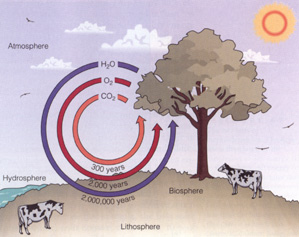
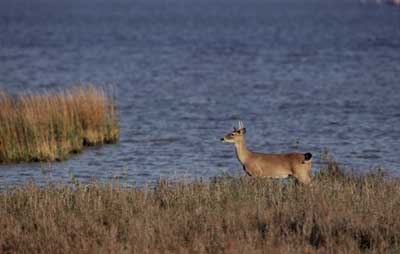
Like cows on a field, deer are salt marsh, grazing herbivores turning grasses into meat and thereby cycling needed molecules.
He had two stories with regard to marshes: "Marshland Elegy" & Fable of Round River .
Seeing in a smaller piece, such as a lake, bog, or estuary, the larger (macro) functions.
Hence, the smaller unit or microcosm, is a model that informs us about the whole, larger macrocosm. Estuaries, as a piece of the entire river and watershed are more productive naturally than any other plant and animal community.
Land, when viewed as a circuit of transferred power is really a milieu of water, energy air and land forming landscape with vegetation for wildlife.
Next step: land energetics | food webs | ecosystem logical dynamics | lakes as microcosms | land organism | cycles | integrity | Round River | Marshland Elegy | land paradox
page, 122.
Coevolution of plant and animal life means that certain dependent relationships occur where predators and prey evolve together with their surrounding conditions.
The whole landscape is important as more than the sum of its constituent parts.
Progressive utilitarianism was challenged.eliminating whole elements of the biocoenose that lack value, or economic return, or commercial payoff
Narrow calculations of economic utility
Irony of farm reclamation during the agricultural recession and Great Depression.
page, 123.
First step: energetics | food webs | ecosystem logical dynamics | lakes as microcosms | land organism | cycles | integrity | land paradox
Three hydrological consequences of removing wetlands
- reduced groundwater percolation or recharge of underground aquifers.
- subsidence of drained land from soil compaction and interstitial water loss.
- increased downstream flooding.
page, 124.Ecological value | Steps to understanding | Aldo Leopold's stories | Energy in redefining ecology | productivity of estuaries | Trophic ecology defined | next
Loss of biological diversity due to economic conversion of marshes loss of native vegetation and solitude appreciated only by ornithologists and cranes.
Marshes have a paleontologic patent of nobility because Cranes have evolved together with these valuable habitats and they need one another to prosper in the future.
But --in contrast-- the language of progressive conservation was set up as adversaries: Humans vs. nature; a war of all against all–based on competition.
"waters like soil are part of the energy circuit."
"sensitivity to the mood of the land."
There is a need to be sustaining the "bioenergetic integrity of ecosystems."
This means that the functions based on:
WEAL or water, energy, air and land, operate in such a way as to assure that the water's quantity, quality, timing of delivery and distribution to all participants in the ecological system, operates with tolerable limits to allow the growth and regrowth of the keystone members of the places that contribute to the productive capacity of the ecological system.
First step: energetics | food webs | ecosystem logical dynamics | lakes as microcosms | land organism | cycles | integrity | land paradox
Integrity refers to the appropriately productive fit among all the contributors to a process, such that the diversification of the roles of each participant add to, strengthen, or extend the capacity of other members of an interdependent system to recover from disturbances or to take advantage of opportunities due to inorganic conditions, or abrupt and unexpected events such as storms, floods, earthquakes, fires, or volcanic eruptions.
page, 126.
First step: energetics | food webs | ecosystem logical dynamics | lakes as microcosms | land organism | Round River | cycles | integrity | Marshland Elegy | land paradox
pipeline of energy leaks in the circuit of energy that is the land.
plants as producers of food and nutrition for consumers
Land as "a maze of services and competitions, of piracies and cooperations."
coevolutionlandscape possesses biological integrity
Round river was a story from Paul Bunyan about a fabled river that flowed into itself in a never ending, revolving fund of decay and renewal.
page, 126.
First step: energetics | food webs | ecosystem logical dynamics | lakes as microcosms | land organism | cycles | integrity | Marshland Elegy | land paradox
"Marshland Elegy"We are all just a separate cog in an ecological mechanism
TVA , saw rivers as valuable for what they transport, falling water.
Flood Control was the preeminent reason for federal interest in Comprehensive Riverine Management.
Conservation as a means of relegating costly actions to government will fail
Leopold's ecological credo required protection of all parts of the ecosystem.
The discovery of the complexity of the land mechanism, is the great achievement of this century. Aldo Leopold called it the "land organism" insisting that as an association of "piracies" and opportunist species, the landscape is as alive as anything on earth and needs to be granted the rights that all people possess-- life, liberty and property! That is the property of nourishing wildlife, fisheries, commerce and humans alike.
The marginal value of land increases and thus runs counter to ecological values that are increased as there are more contributing landscapes, not fewer, to the functioning processes of say water or nutrient flows.
First step: energetics | food webs | ecosystem logical dynamics | lakes as microcosms | land organism | cycles | integrity | land paradox
Who could afford Leopold's ethics?The paradox is that land becomes valuable as it disappears and landscape, in the sense of Marsh, Shaler, Leopold, Carson or Odum becomes more valuable as its area increases in extent and contribution to the watershed.
Local government dependence on property taxes works to destroy marshes.
"Land-use ethics is still dominated by economic self-interest."
Ezekiel & Isaiah
"I am glad I shall never be young without wild country to be young in."
page, 133."islands of diversity amidst a sea of sameness ... meant a dedication to landscape renewal."
First step: energetics | food webs | ecosystem logical dynamics | lakes as microcosms | land organism | cycles | integrity | Marshland Elegy | land paradox
The politics of estuarine protection
Mayr | Thomas | Wilson | Hardin | Darwin | Margulis | Keller | Watson
Ecological value | Steps to understanding | Aldo Leopold's stories | Energy in redefining ecology | productivity of estuaries | Trophic ecology defined
Oceanography | Notes on Complete book | New means of accounting for damages | Leopold